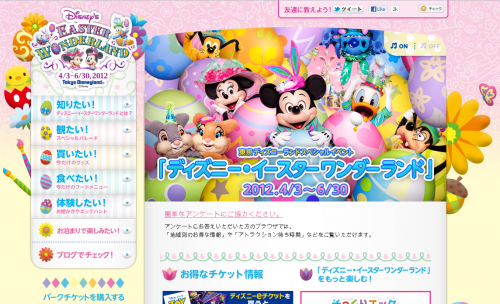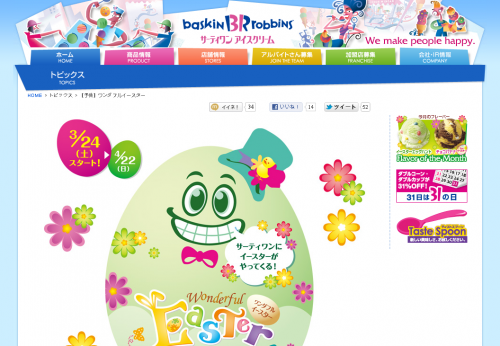It is Easter Sunday. How about other places on the globe such as Japan? Christians are less than 1% of the population of Japan. Yet, because of globalization, geographic locations plays less and less of a role in defining culture. Many people around the world now consume the same food, clothing, music, movies, and technology.
Global corporations play a role in transmitting culture from place to place. Recently, American corporations in Japan have been trying to popularize and commercialize Easter. Disney’s theme park in Tokyo, for example, has promoted Easter with the Disney Easter Wonderland since 2010:
Likewise, beginning last year, Baskin Robbins has been promoting the holiday. This year they have a month-long Wonderful Easter Campaign:
It will be very interesting to see how Easter becomes part of Japanese culture. When the Japanese adopted Valentine’s day, for example, they added their own twist. Women are expected to give chocolate to men; men are supposed to return the favor by giving candy to women on March 14th, White Day. I would not be surprised to find that Easter becomes popular in Japan, but celebrated with a twist – a Japanese flavor.
—————————
Sangyoub Park is an assistant professor of sociology at Washburn University, where he teaches Social Demography, Generations in the U.S. and Sociology of East Asia. His research interests include social capital, demographic trends, and post-Generation Y.



Comments 8
Elena — April 8, 2012
As much Jesus content as Japanese Christmas, I guess :__D
Andrew S — April 8, 2012
Perhaps very religious people can't separate a holiday/celebration from their religious beliefs, but like Christmas, Easter comes at a time of the year when we celebrate something that is universal (on this hemisphere): Spring. Christmas celebrates family and friends and appreciation of each other during the cold, short winter days. Easter celebrates rebirth, renewal, springtime.
I have no idea if I'm right, but it seems that "eggs" are a symbol of a new generation, of food, of rebirth.
And not zombie rebirth.
Perhaps if the christians out there are upset in any way that their holidays are being taken over by secular individuals interested in celebrating the life we all share together, they shouldn't have mingled their holidays with anything but religious stuff.
Either way, I think it's fun to go on an easter egg hunt and have an easter bunny and easter basket.
And I really can't wait to see how the Japanese make this one weird :D
Umlud — April 8, 2012
What could be interesting is to do a comparison between Japanese (~99%
non-Christian) acculturation of Easter against Chinese (~99%
non-Christian, but avidly anti-Japanese in many cultural contexts),
South Korean (43%* Christian, heavily influenced by social
Confucianism), and Taiwanese (~4% Christian, living in a very diverse
religious milieu) acculturations. These four countries (yes, I'm
including Taiwan as a separate national entity here), would make for an
interesting set to study, because they are all heavily industrialized
(China growing in this department every day), highly educated, share a
similar history of Confucianism (to varying degrees), relatively capable
of dynamic reinterpretation of Western concepts to fit into local
cultural contexts, and are polarized against each other to varying
degrees (both socially and politically), but also recognize (again to
varying degrees) that they have to live with each other.
The point that South Korea has a sizable Christian population (but one
that is situated within a heavily Confucian social structure) makes it
an interesting case when looking at how Christian holy days - especially
those that have become more social holidays in the West - become
integrated into society.
*43% among the 53% of S. Koreans who profess religious belief.
TI — April 9, 2012
I am not a Christian, but it's still funny to see how (according to this post) Christian = Catholic or Protestant. It's not easter Sunday for about 1/3 of Christian population of the Planet.
Anonymous — April 9, 2012
When I took a Japanese culture class (a number of years ago) the observation was made that if you added up all of the adherents of all of the different religions in Japan you'd end up with a number 3x the population of the country. The Japanese have an affinity for the cultural trappings of many different religions and "practice" multiple religions.
For example, a Japanese couple might offer salt to the kitchen gods, go pray at a Shinto temple, then have a white gown full-on "Christian" style wedding, all in the same day and not see a contradiction.
They certainly do have a delightful way of adding their own twists, though. My love of Anime had increased my interest in Japanese culture and I've always been amused at how much we have in common while at the same time are completely different. Culture is awesome.
eeka — April 10, 2012
White Day? That's racist!
;-D